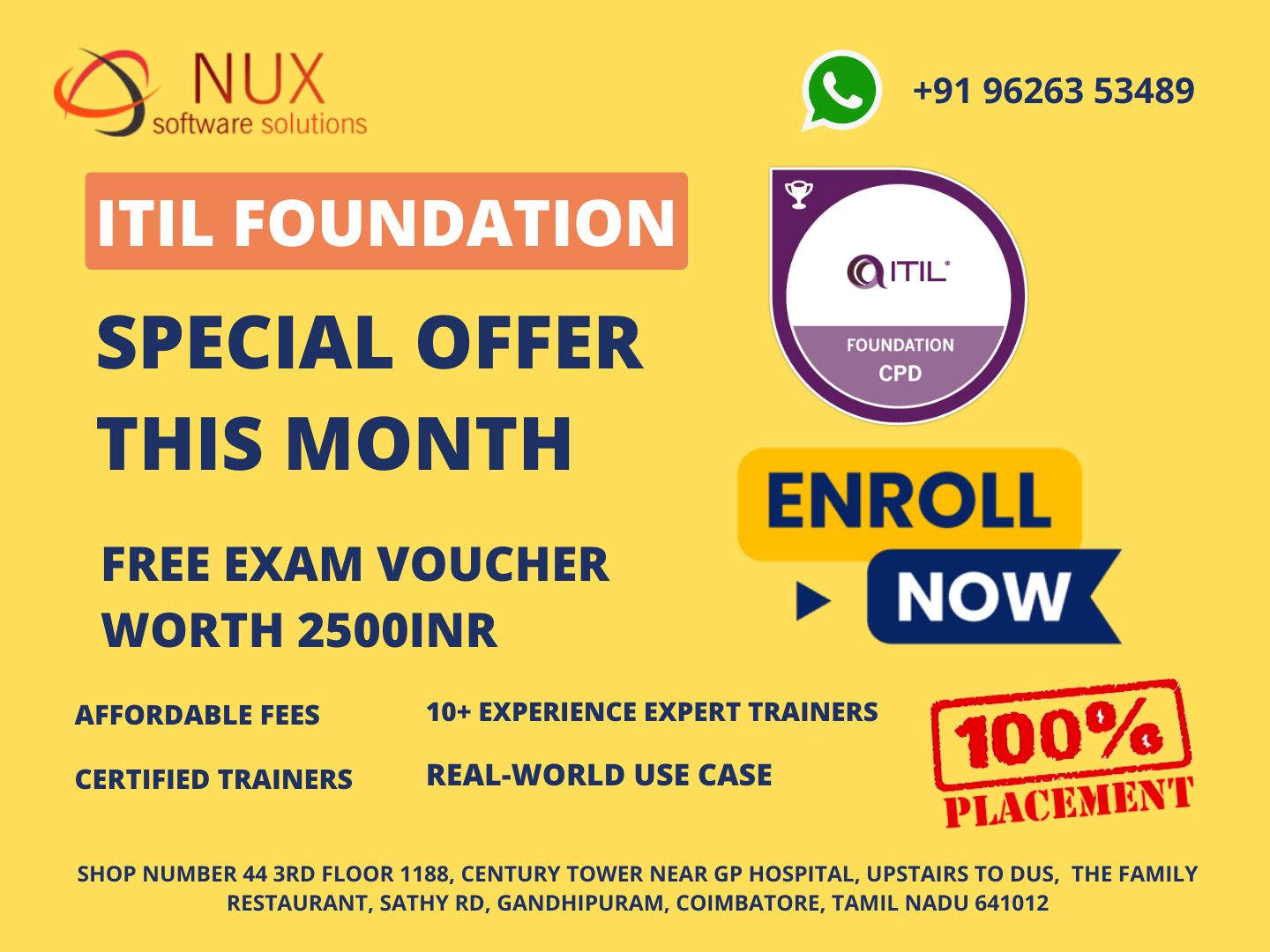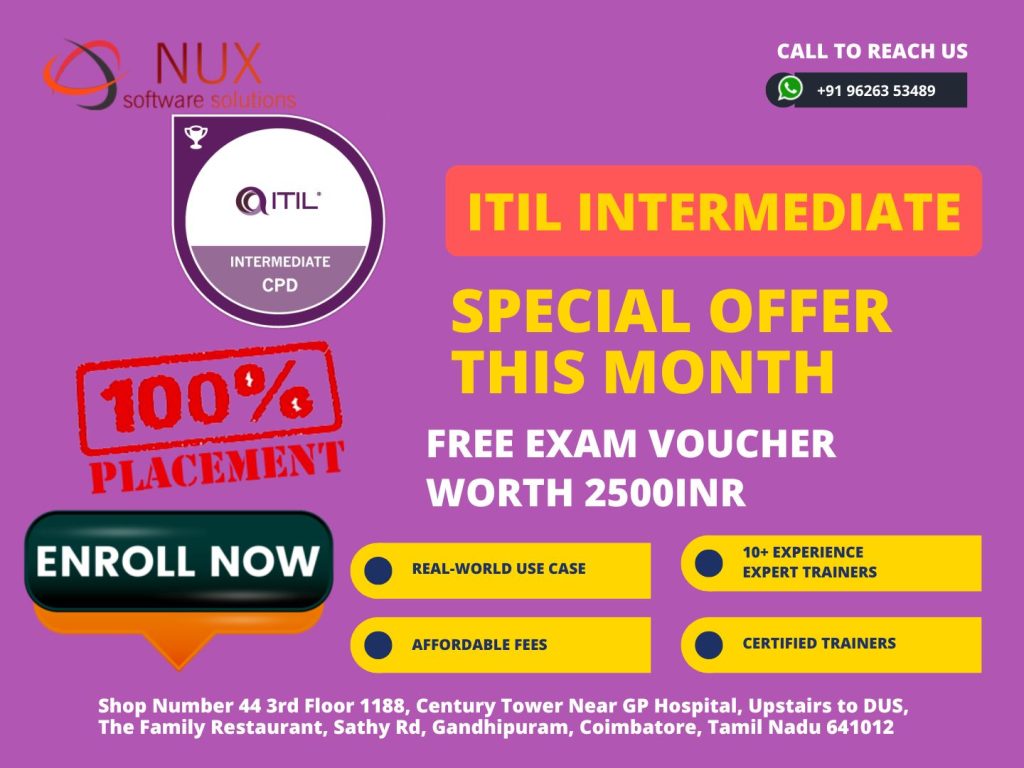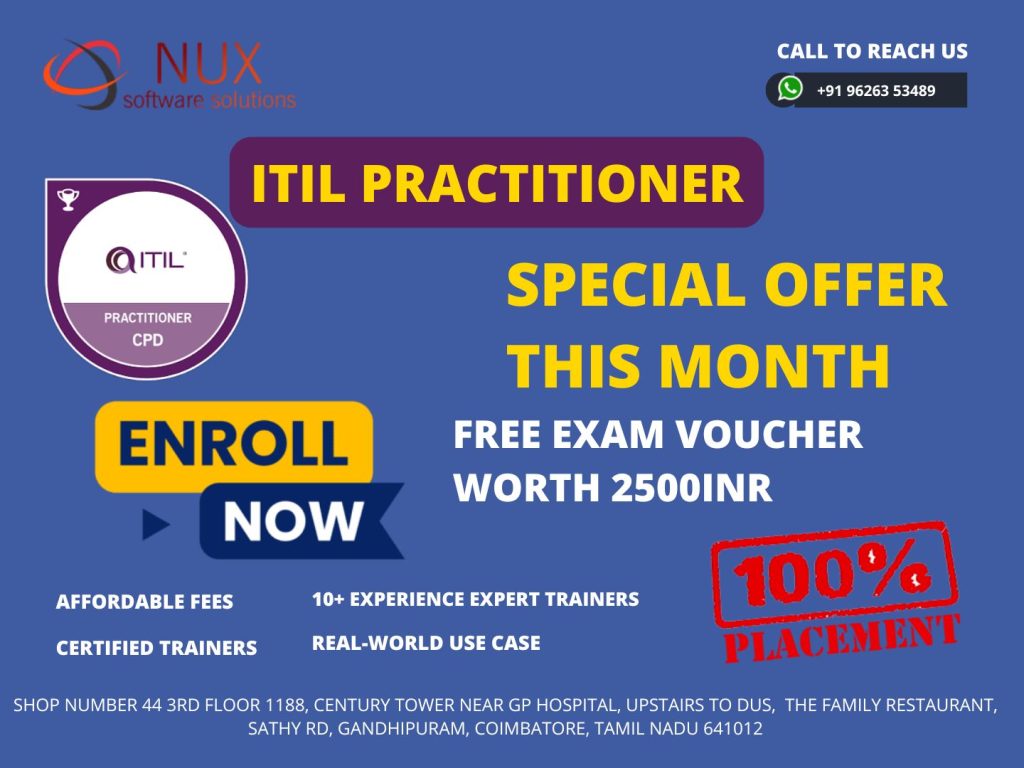ITIL Foundation Training and Certification in Coimbatore

ITIL Foundation Training and Certification in Coimbatore
Course Overview
The ITIL Foundation certification is the entry-level credential for anyone looking to gain a solid understanding of IT Service Management (ITSM) best practices. Based on the latest ITIL 4 framework, this course introduces learners to the key elements, concepts, and terminology used in the ITIL service lifecycle, including how ITIL can be used to enhance IT service management and align IT services with business needs.
This training is designed for professionals beginning their ITIL journey and provides a strong foundation for further certifications in the ITIL scheme. It’s also ideal for IT managers, support teams, and those involved in IT service delivery.
With the ITIL Foundation training in Coimbatore, you will gain practical insights into ITIL principles, the four dimensions of service management, and the service value system (SVS), preparing you for the ITIL Foundation exam and real-world ITSM roles.
Key Course Features
Comprehensive coverage of ITIL 4 framework
Real-time scenarios and case studies
Interactive learning with expert instructors
Mock tests and exam preparation guidance
Flexible online and classroom training options
Why Choose ITIL Foundation Certification?
Globally recognized credential in IT service management
Opens doors to intermediate and advanced ITIL certifications
Increases your ability to contribute to business value through IT services
Boosts your professional credibility in ITSM roles
Essential for professionals working in IT service delivery, support, and operations
Who Should Take This Course?
Freshers seeking ITSM roles
IT professionals looking to understand ITIL basics
System administrators and support engineers
Team leads and project managers in IT environments
Why Train With Us in Coimbatore?
Certified trainers with real-world experience in ITSM
Hands-on projects and simulations
100% syllabus coverage with updated ITIL 4 concepts
Batch flexibility: weekend, weekday, and online classes
Career and certification support from industry experts
Gain a strong foundation in IT Service Management and prepare for a successful ITIL career. Join our ITIL Foundation training course in Coimbatore and take your first step toward becoming an ITIL-certified professional.
ITIL Foundation Syllabus
Modules
Chapter 1 :
Describe the concept of best practices in the public domain, Describe and explain why ITIL is successful, Define and explain the concept of a service, Define and explain the concept of internal and external customers, Define and explain the concept of internal and external services, Define and explain the concept of service management, Define and explain the concept of IT service management, Define and explain the concept of stakeholders in service management, Define processes and functions, Explain the process model and the characteristics of processes
Chapter 2 :
Specifically, candidates must be able to:
Describe the structure of the ITIL service lifecycle, Account for the purpose, objectives and scope of service strategy, Briefly explain what value service strategy provides to the business, Account for the purpose, objectives and scope of service design, Briefly explain what value service design provides to the business, Account for the purpose, objectives and scope of service transition, Briefly explain what value service transition provides to the business, Account for the purpose, objectives and scope of service operation, Briefly explain what value service operation provides to the business, Account for the main purpose, objectives and scope of continual service improvement, Briefly explain what value continual service improvement provides to the business
Chapter 3 :
Utility and warranty, Assets, resources and capabilities, Service portfolio, Service catalogue (both two-view and three-view types), Governance, Business case, Risk management, Service provider, Supplier, Service level agreement (SLA), Operational level agreement (OLA), Underpinning contract, Service design package, Availability
Chapter 4 : Service knowledge management system (SKMS), Configuration item, Configuration management system, Change, Change types (standard, emergency and normal), Event Alert, Incident, Impact, urgency and priority, Service request, Problem, Workaround, Known error, Known error database (KEDB), The role of communication in service operation, Types of services, Change proposals, Outcomes, Patterns of business activity, Customers and users, The Deming Cycle
Chapter 5 :
Technology architectures and management architectures, Explain the continual service improvement approach, Understand the role of measurement for continual service improvement and,
explain the following key elements:
Relationship between critical success factors (CSF) and key, performance indicators (KPI), Baselines, Types of metrics (technology metrics, process metrics, service metrics)
Chapter 6 : Service strategy
State the purpose, objectives and scope for:
Service portfolio management, The service portfolio, Financial management for IT services, Business case, Business relationship management, Service design, Explain the purpose, objectives, scope, basic concepts, process
Chapter 7 :
Service level management (SLM)
The following list must be covered:
Service-based SLA, Multi-level SLAs, Service level requirements (SLRs), SLA monitoring (SLAM) chart, Service review, Service improvement plan (SIP), The relationship between SLM and BRM
State the purpose, objectives and scope for:
Service catalogue management, Availability management, service availability, Component availability, Reliability, Maintainability, Serviceability, Vital business functions (VBF), Information security management (ISM), Information security policy, Supplier management, Supplier categories, capacity management, Capacity plan, Business capacity management, Service capacity management, Component capacity management, IT service continuity management, Purpose of business impact analysis (BIA), Risk assessment, Design coordination
Chapter 8 :
Service transition, Explain the purpose, objectives, scope, basic concepts, process activities and interfaces for:
Change management, Types of change request, Change models, Remediation planning, Change advisory board / emergency change advisory board, Lifecycle of a normal change, State the purpose
objectives and scope for:
Release and deployment management, Four phases of release and deployment, Knowledge management, Data-to-Information-to-Knowledge-to-Wisdom (DIKW) & SKMS, Service asset and configuration management, Transition planning and support, Service operation, Explain the purpose, objectives, scope, basic concepts
process activities and interfaces for:
Incident management, Problem management, State the purpose
Objectives and scope for:
Event management, Request fulfilment
Chapter 9 :
Access management, Continual service improvement, State the purpose
objectives and scope for:
The seven-step improvement process
Specifically, candidates must be able to:
Explain the role, objectives and organizational structures for
The service desk function
State the role and objectives OF :
The application management function with application development, The IT operations management function (IT operations control and facilities management), Process owner, Process manager, Process practitioner


